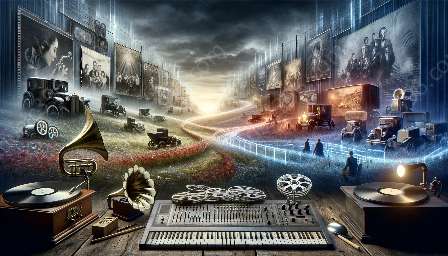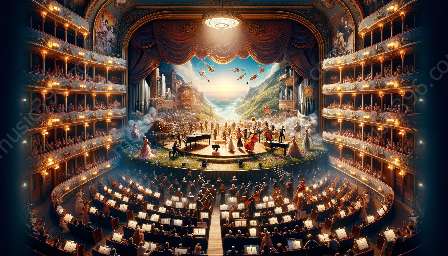When it comes to the art of filmmaking, the soundtrack plays a pivotal role in enhancing the storytelling and emotional resonance. In this article, we will explore how movie soundtracks contribute to the narrative structure of a film, delve into case studies of notable movie soundtracks, and analyze the intricacies of soundtracks in shaping cinematic experiences.
The Power of Music in Film
One of the most powerful elements in cinema is the soundtrack. The relationship between music and film is symbiotic, as each enhances the other. Music has the ability to evoke emotions, create atmosphere, and emphasize key moments, and when skillfully employed, it can elevate the narrative structure of a film to new heights.
Enhancing Emotional Resonance
Soundtracks have the capacity to deeply impact the emotional resonance of a film. They can intensify the audience's connection to characters and their experiences, heighten tension, and evoke nostalgia. Through the careful selection of musical compositions, filmmakers can effectively convey the intended mood and amplify the emotional impact of key scenes.
Setting the Tone and Atmosphere
Music has the ability to set the tone and atmosphere of a film from the opening credits to the final scene. It establishes the overall mood, whether it be suspenseful, uplifting, or melancholic, and contributes to the immersive nature of storytelling. The pairing of specific musical themes with visual cues enhances the audience's understanding of the narrative landscape.
Case Studies of Notable Movie Soundtracks
To illustrate the significant role of soundtracks in film, we will delve into case studies of notable movie soundtracks that have left an indelible mark on cinematic history.
1. 'Inception' (2010) - Hans Zimmer
The soundtrack of 'Inception,' composed by Hans Zimmer, is renowned for its ability to mirror the film's intricate and dreamlike narrative. The use of the iconic 'BRAAAM' sound became synonymous with the film's themes of subconscious exploration and shifting realities. Zimmer's fusion of electronic and orchestral elements contributed to the film's gripping tension and emotional depth, establishing a sonic landscape that perfectly complemented the complex narrative structure.
2. 'The Dark Knight' (2008) - James Newton Howard and Hans Zimmer
The soundtrack of 'The Dark Knight' boasts a haunting and intense score, courtesy of composers James Newton Howard and Hans Zimmer. The score's pulsating rhythms and brooding melodies echoed the film's dark and psychologically charged storytelling. The use of recurring motifs and leitmotifs underscored the inner struggles of the characters, emphasizing the thematic elements and contributing to the overall narrative structure.
Analyzing the Role of Soundtracks
When analyzing the integral role of soundtracks in the narrative structure of a film, it is essential to consider several key aspects:
1. Emotional Resonance
Soundtracks have the capacity to evoke a wide range of emotions, from elation to sorrow, and everything in between. The emotional resonance created by the music enhances the audience's connection to the film's characters and their journeys, ultimately shaping the narrative structure.
2. Character Development
Through the use of thematic motifs and leitmotifs, soundtracks contribute to the development of characters by embodying their internal conflicts, motivations, and transformations. The music acts as a reflection of their emotional arcs and can provide insight into their complexities, adding depth to the narrative structure.
3. Narrative Pacing and Tension
Soundtracks play a crucial role in guiding the pacing and tension within a film. The strategic use of music can heighten suspense, create anticipation, and build climactic moments, thereby shaping the ebb and flow of the narrative structure.
4. Symbolism and Subtext
Soundtracks can serve as a vehicle for conveying symbolism and subtext within a film. The musical choices made by composers and filmmakers can imbue scenes with layers of meaning, enriching the narrative structure and inviting deeper interpretation from the audience.
Conclusion
In conclusion, movie soundtracks play a pivotal role in contributing to the narrative structure of a film. Through their ability to enhance emotional resonance, set the tone and atmosphere, and add depth to character development, soundtracks enrich the cinematic experience. Case studies of notable movie soundtracks such as 'Inception' and 'The Dark Knight' highlight the profound impact that music can have on storytelling. By analyzing the intricate nuances of soundtracks, we gain a deeper appreciation for their contribution to the art of filmmaking and the immersive power they hold over audiences.





















